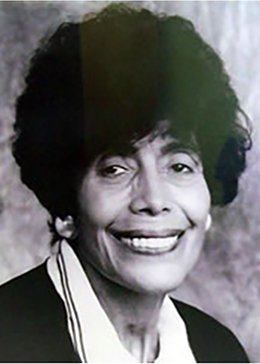Wynona M. Lipman

Evelyn Wynona Moore was born in 1923 in LaGrange, GA. At a time when many African Americans in the South subsisted through sharecropping, the Moore family was relatively privileged. Wynona's parents met and married while college students. John Moore owned a pharmacy and worked as a bricklayer, while Annabelle for a time worked as a teacher. Wynona and her three siblings attended public school in LaGrange, and received further education at home from Annabelle. Their parents prized education, and the children went on to have successful careers; Wynona's two brothers practiced medicine, and her sister became a teacher.
After graduating high school at age fourteen, Wynona received a bachelor's degree from Talladega College, then a master's from Atlanta University, both in French. She began teaching French at Morehouse College, tutoring for a time a young Martin Luther King, Jr. Wynona received a Rockefeller Grant to study at Columbia University, and then a Fulbright Fellowship to study in France.
After marrying Matthew Lipman and completing her Ph.D. in French and Social Sciences, Lipman returned to teaching, but had trouble finding employment in higher education, particularly in the Northeast.
The Lipmans eventually moved to Montclair, New Jersey, where Wynona worked as a part-time teacher and became involved with the PTA and NAACP. Here began her interest in politics. After the city began dumping dirty snow with garbage on a playground, Lipman and other parents complained to the town's leaders. When nothing was done, they formed a human chain around the playground in protest. Her political activities caught the attention of the local Democratic Party, and she soon became a Democratic committeeperson, then a town chairperson.
Lipman was elected to a seat on the Essex County Board of Chosen Freeholders in 1968, becoming the first African American woman elected to a county freeholder board in New Jersey. In 1971 she was chosen as the board's director. That year she also ran for state senate, narrowly defeating incumbent Republican senator Milton Waldor by a margin of 928 votes. She became New Jersey's first black woman senator, and at the time she began was the only woman and the only African American serving.
According to a press account, "When Lipman arrived in Trenton, there were no ladies' lavatory facilities for her in the Senate chamber. The other senators didn't consider installing a restroom, so while they had a private men's lavatory, Lipman had to leave the chamber and use a public bathroom down the hall. That wasn't convenient, or always simple."
Meanwhile, New Jersey was redrawing district lines to comply with the U.S. Supreme Court's "one man, one vote" mandate. Lipman's district was eliminated and she moved from Montclair to Newark to keep her seat. When Lipman arrived in Newark, it was still in economic and political turmoil. Urban flight and a decline in manufacturing left Newark a poor urban center in the 1960s, surrounded by wealthier suburbs. Lipman proved herself an adept politician who served the interests of her constituents and fought for justice for the disenfranchised. Throughout her career, Lipman's focus was on those who had the least access to the political system. At the time of her death, she was the longest-serving member of the state senate, having served for 27 years.
Lipman requested and was put on the senate appropriations committee in her first term. She would use this position to combine economic and social issues to support minorities, women, children, and families. After the failure of a referendum proposing a state Equal Right Amendment and an assembly bill to establish a study on sex discrimination in New Jersey's, Lipman vowed to reintroduce the legislation and fight for its passage. In July 1978, Governor Brendan Byrne signed a law creating the Commission on Sex Discrimination in Statutes. With Lipman as chair, the Commission uncovered discrimination in New Jersey's laws and helped draft legislation to eliminate the inequalities. She would also go on to sit on the Governor's Council on AIDS, the Task Force on Chile Abuse and Neglect, and the New Jersey Court Team on Domestic Violence.
Wynona Lipman sponsored the 1981 Domestic Violence Act, which enhanced the protection of people suffering domestic violence. In particular, the law listed nine crimes of domestic violence, made it easier to file for restraining orders against abusive spouses, provided training for law enforcement officers in handling domestic violence and gave them greater authority to act to remove a batterer from the home, and improved statistical record keeping for domestic violence complaints. Lipman would go on to sponsor more domestic violence bills throughout her life, including the Prevention of Domestic Violence Act of 1990, which expanded protections to elderly and disabled people. Today, New Jersey has expanded domestic violence legislation to include 19 crimes. The strength of New Jersey's domestic violence laws is a testament to Lipman's hard work and devotion to marginalized groups.
Lipman's legislation shows a concern for prevention and enforcement around issues of domestic violence, sexual assault, inequality, and protecting children. More that 145 laws were passed through her efforts. "If you want to create change, don't just get to know important people, become important people," she said.
Lipman died on May 9, 1999, but her legacy lives on. In 2000, the Senate and General Assembly passed an Act establishing the Senator Wynona Lipman chair in Political Leadership at Rutgers' Center for the American Woman and Politics. Today, Wynona's House, a nonprofit founded in her name, addresses child abuse and neglect throughout Essex County.
AWARDS & RECOGNITIONS
2003 Wynona Moore Lipman Ethnic Studies Center at Kean University dedicated
2000 Wynona Lipman Chair in Women’s Political Leadership at Eagleton Institute created
1998 New Jersey's Women's Hall of Fame